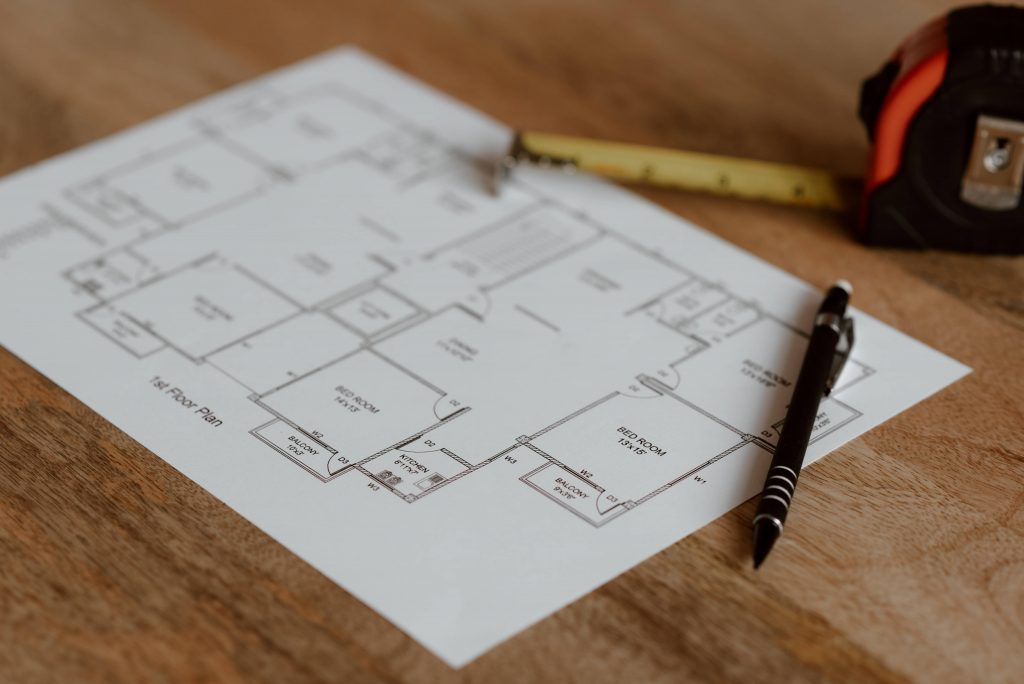Starting any construction project can be time-consuming, costly, and well, quite confusing for someone with little experience. Have you tried contacting a few contractors to get quotes and estimates only to find out that the number varies greatly from one contractor to the other for exactly the same specifications of a project?
How could it be that the same amount of material costs, labour costs, and other charges can have such varying overall costs? This is mainly due to two reasons; firstly, it depends on the contractor you are approaching, and their level of research and expertise before giving you that number, and secondly, it varies based on whether you’ve asked for a quote or an estimate.

What Is An Estimate?
An estimate is as good as calculating the costs of a trip without knowing where you are going, where you’d be living, and how many days you plan on staying there. Of course, you’d have some idea about how much it can cost, but it would be as rough an estimate as it can get.
Similarly, estimates are usually calculated without any proper plans and are often offered to clients that don’t have any design drawings. These are just rough ballpark figures of how much their project CAN cost, based on clients requests and a rough scope of works. Builders usually pull these numbers from old figures from previous projects or based on their own industry experience.
Needless to say, estimates are highly unreliable and not the best number to start off any project, big or small. Clients can expect a lot of surprises and miscalculated costs once the project is underway.
What Is A Quote?
A quote is your cost blueprint of the project. This is often generated after a thorough understanding and calculation of the client’s design drawings. These design drawings need to be generated with the help of an architect or building designer to map out exactly what the project entails, including details about the area covered, materials used, and installations required. These design drawings will assist the contractor in getting a complete overview of the project and the time and cost required to complete it.
A builder will likely request more time to research material and other related costs in order to generate as accurate a quote as possible. You are likelier to get more accurate, and easily comparable quotes from builders if you have a detailed and well-planned design drawing.
Getting quotes to eliminate the chances of getting any surprise overhead costs, or miscalculations once the project is underway. A reliable and trustworthy builder will be able to map out the entire project, including all costs and provide you with a clear plan for how they plan on completing the project.

5 FAQ’S To Help You Understand The Difference Between A Quote or an Estimate.
Following are the top five questions relating to differences between a quote or an estimate and why a quote will save you money, conflicts, and miscommunications with your contractors in the long run:
Quote VS Estimate | FAQ #1
Is a Quote More Accurate Than An Estimate?
An estimate is as good as an educated guess. It does not come with reassurances or confirmations that a project will indeed cost the estimated price. A contractor can easily underestimate the costs just so that they can earn your business. Without a clear idea of what materials you’d use and clear specifications about the project, it is very easy to blame all these factors for the ‘surprise’ costs that’d keep popping up.
A quote, since it is based on detailed plans, are more accurate and reliable. A reliable contractor will provide quotes from providers to help you understand the cost of materials, labour, tools, and rentals to provide you with a close approximation of how much the project will cost from start to finish.

Quote VS Estimate | FAQ #2
How Long Does It Take For A Builder To Prepare A Quote?
A contractor might give you an estimate in a matter of a few hours, by roughly calculating the expected costs of a project. It can take days and sometimes weeks (depending on the size of the project) for a contractor to offer you a quote as they will need to contact suppliers for material costs.
They will also calculate costs for any permissions, or for shipping materials that may not be available in your region, and other related costs. Though time-consuming, it will save you any surprises later on.
Quote VS Estimate | FAQ #3
How Do I Know A Builder Is Trustworthy?
Requesting a quote from different contractors can give you a great idea about the expertise and professionalism of a contractor. You can learn a great deal only by understanding how thorough they are in their research and how invested they are in your project. A reliable contractor will provide details about all the related costs of a project.
They will invest their time and energy to get quotes from vendors to provide you with accurate and updated costs. If a contractor offers you a quote within a few minutes of you explaining the project, know that they aren’t doing their job well enough to be trusted with your money or your project.

Quote VS Estimate | FAQ #4
What Will My Quote Tell Me?
When a builder provides you a detailed quote, you received a complete break down of the cost and which areas will cost you the most. It provides you with a accurate picture of how much you will be out of pocket and more importantly get you thinking if this fit out is something you can afford at this time.
If the quote is coming in higher than you expected, you can speak to your builder about changing some of the more expensive materials or cheaper options. But, without a detailed quote, you would have been none the wiser about what aspects of your project are going to cost you the most.
Similarly, If you don’t have your design plans created, a professional contractor would request you to get those completed first. They’d encourage you to make final design and material decisions before giving you a quote. Doing so allows you to have a clearer vision for your project so that the end product as close to what you had imagined it to be as possible.
Quote VS Estimate | FAQ #5
Is A Quote A Final Price?
In short, yes, once you have signed off on your quote this will be the final figure you will pay for your fit-out project, but always read the terms and conditions to find out if there are any clauses of your contract relating to this. On the other hand, you cannot hold a contractor accountable for an estimate since it is roughly calculated, and they usually have a footnote in their contacts that affirms this.
You can, however, hold them accountable for a quote, since it needs to be thoroughly researched. For this reason, quotes are often only valid for a limited period of time, oftentimes for only a month. A professional contractor would research updated costs before giving you a quote and offer a disclaimer of its validity. If you plan on getting the project started at a later date, say two or months from the time you start researching, then you may not be able to get an accurate quote. Since a contractor can be held accountable for what they quote, they’d be more careful with what they offer you.
Quote VS Estimate | FAQ #6
Estimates Come with Surprises, Quotes Come with a Game Plan
If anything, an estimate is like a trap an unprofessional contractor might use to get you to do business with them. They’d lure you in with promises of getting the job done faster and more cost-effectively without offering any game plan of HOW they will do it. A quote, on the other hand, is a complete map of your project from start to finish. You get more control because you are empowered with all the information you need about bringing your project to successful completion.
If you are looking for a smoother run with your project, you’d be better off ensuing the fit out companies you approach are providing you with quotes not estimates. Estimates not only lead to additional costs, but also conflicts and friction with the people you are working with.
A quote might initially seem cumbersome, but just a little effort right in the beginning can save you a lot of time, money, and stress in the long run. Quotes help clarify expectations and costs, allowing you as the owner to get the ball rolling more confidently, and with lesser chances of any hiccups or disputes later on.
If you aren’t sure where to start, you can always call up one of our team of experts to guide you through the process of getting the design drawings ready, making important decisions, and ensuring that you entrust only the finest professionals in the industry for your project. Call Us On: 1300 LETS BUILD or send us an email at: [email protected]
FAQs
Frequently Asked Questions
1. What is the difference between a quote and an estimate?
A quote is a fixed price for a specific project, whereas an estimate is an educated guess based on available information. A quote is binding, while an estimate might change depending on unforeseen factors.
2. When should I ask for a quote instead of an estimate?
You should request a quote when you have all the project details finalized, as this will give you a fixed price. If you’re still in the planning stages or there are unknown factors, an estimate may be more appropriate.
3. Is a quote legally binding?
Yes, a quote is legally binding once accepted by both parties. It guarantees that the price quoted will not change, unless both parties agree to new terms.
4. Can an estimate change during the project?
Yes, an estimate can change during a project if new information or unexpected costs arise. It’s more flexible than a quote and reflects potential price variations.
5. What factors can affect a quote or estimate?
Factors that can affect both quotes and estimates include material costs, labor availability, project complexity, and any unexpected conditions that arise during the project.
6. How can I ensure an accurate estimate or quote for my project?
To get an accurate quote or estimate, provide detailed project specifications, materials, timelines, and any constraints. The more information you share, the more precise the pricing will be.
7. Are quotes and estimates free?
Most contractors offer free estimates, but quotes may require more detailed planning and sometimes incur a fee. Always ask beforehand to clarify.
8. Can I negotiate after receiving a quote or estimate?
Yes, negotiation is possible after receiving an estimate as it’s not binding. However, once a quote is agreed upon, the price is typically fixed unless the scope of work changes.
{ “@context”: “https://schema.org”, “@type”: “FAQPage”, “mainEntity”: [ { “@type”: “Question”, “name”: “What is the difference between a quote and an estimate?”, “acceptedAnswer”: { “@type”: “Answer”, “text”: “A quote is a fixed price for a specific project, whereas an estimate is an educated guess based on available information. A quote is binding, while an estimate might change depending on unforeseen factors.” } }, { “@type”: “Question”, “name”: “When should I ask for a quote instead of an estimate?”, “acceptedAnswer”: { “@type”: “Answer”, “text”: “You should request a quote when you have all the project details finalized, as this will give you a fixed price. If you’re still in the planning stages or there are unknown factors, an estimate may be more appropriate.” } }, { “@type”: “Question”, “name”: “Is a quote legally binding?”, “acceptedAnswer”: { “@type”: “Answer”, “text”: “Yes, a quote is legally binding once accepted by both parties. It guarantees that the price quoted will not change, unless both parties agree to new terms.” } }, { “@type”: “Question”, “name”: “Can an estimate change during the project?”, “acceptedAnswer”: { “@type”: “Answer”, “text”: “Yes, an estimate can change during a project if new information or unexpected costs arise. It’s more flexible than a quote and reflects potential price variations.” } }, { “@type”: “Question”, “name”: “What factors can affect a quote or estimate?”, “acceptedAnswer”: { “@type”: “Answer”, “text”: “Factors that can affect both quotes and estimates include material costs, labor availability, project complexity, and any unexpected conditions that arise during the project.” } }, { “@type”: “Question”, “name”: “How can I ensure an accurate estimate or quote for my project?”, “acceptedAnswer”: { “@type”: “Answer”, “text”: “To get an accurate quote or estimate, provide detailed project specifications, materials, timelines, and any constraints. The more information you share, the more precise the pricing will be.” } }, { “@type”: “Question”, “name”: “Are quotes and estimates free?”, “acceptedAnswer”: { “@type”: “Answer”, “text”: “Most contractors offer free estimates, but quotes may require more detailed planning and sometimes incur a fee. Always ask beforehand to clarify.” } }, { “@type”: “Question”, “name”: “Can I negotiate after receiving a quote or estimate?”, “acceptedAnswer”: { “@type”: “Answer”, “text”: “Yes, negotiation is possible after receiving an estimate as it’s not binding. However, once a quote is agreed upon, the price is typically fixed unless the scope of work changes.” } } ] }If you enjoyed reading “Quote vs Estimate – Understand The Major Differences”, you may also be interested in:
- Link to other posts by ImpeccaBuild as shown below. Change as required per post.
- Choosing the Right Commercial Space for Your Business
- What is a Fit Out
- Sustainable Building Materials | An Impeccable Guide
